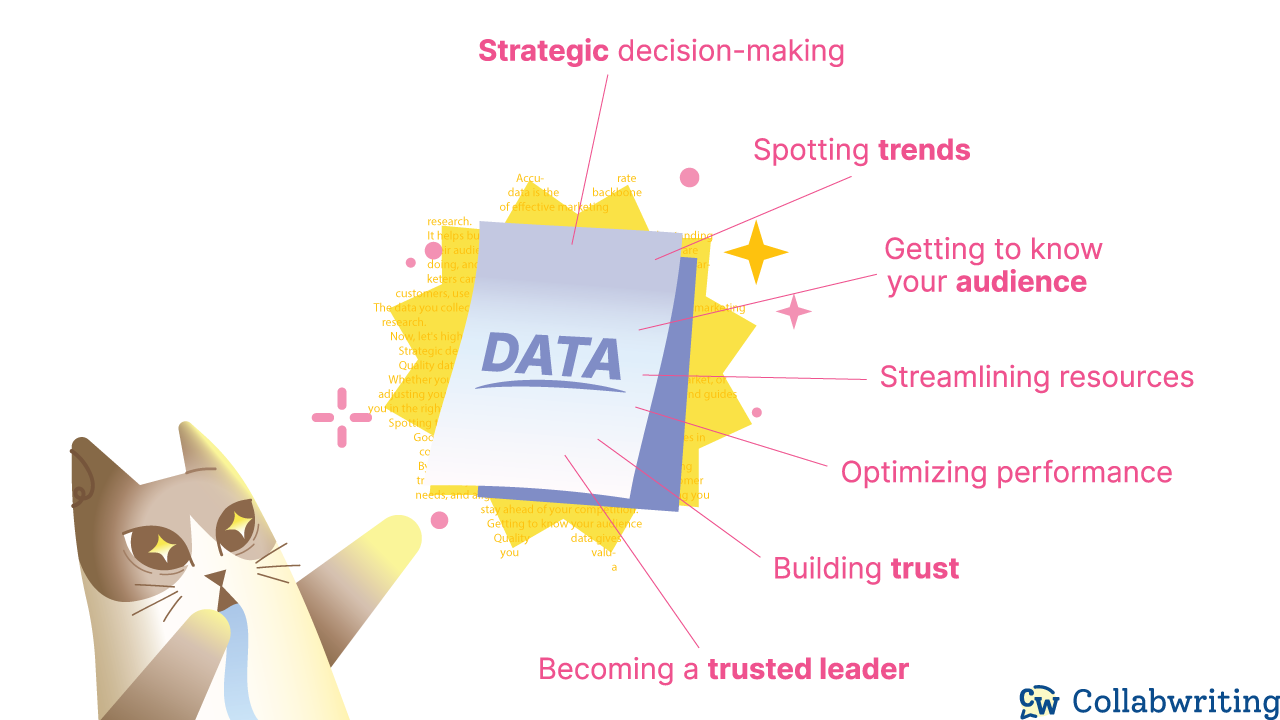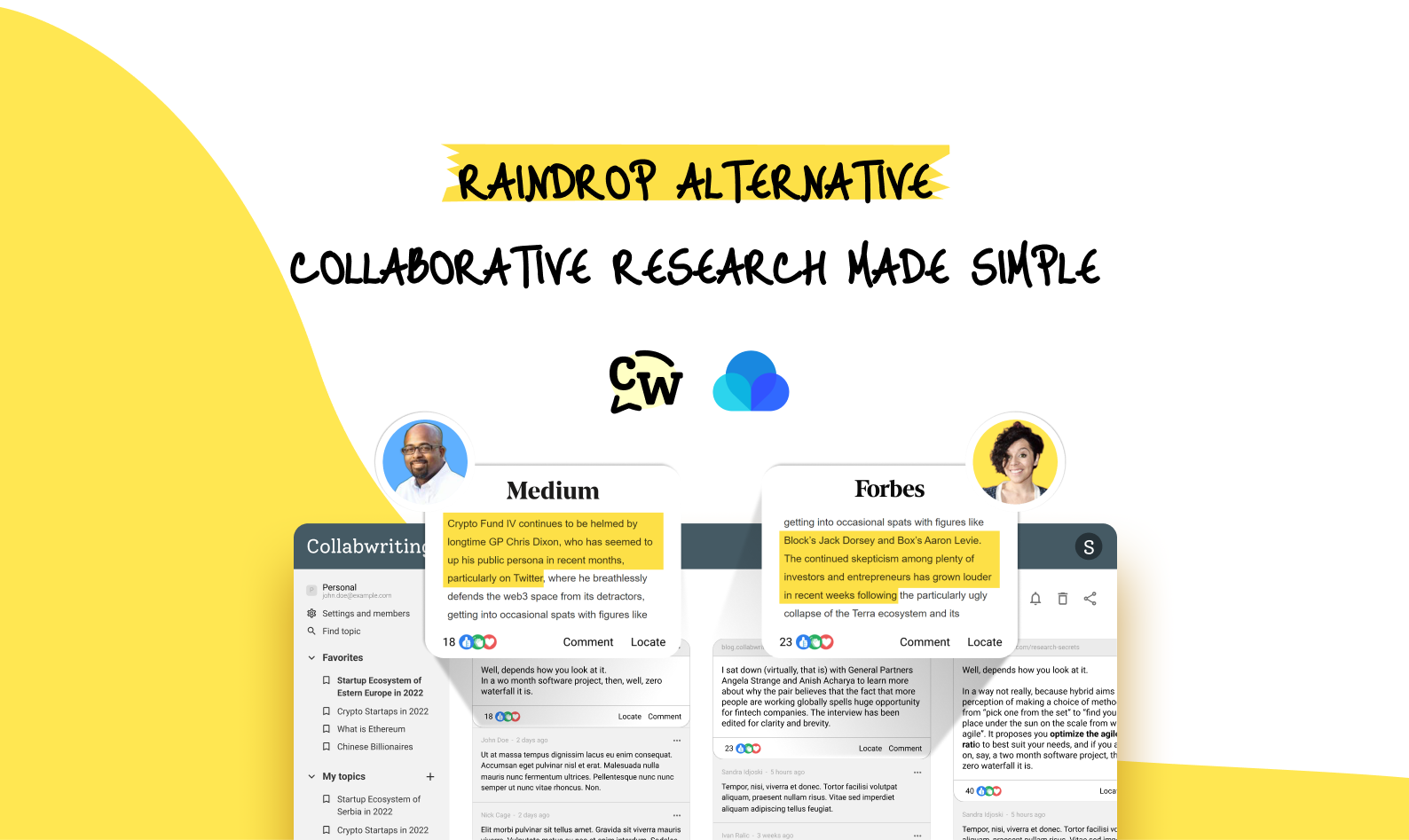Simply put, market research data quality means information that is accurate, reliable, and relevant. And reliable information comes from trustworthy sources ensuring you can make decisions with confidence.
But let's look closer at the benefits and importance of quality data in marketing research and how verifying information can help.
Why Data Quality Matters in Market Research
Accurate and high-quality data is the backbone of effective marketing research.
It helps businesses make smart choices by:
- Understanding their audience
- Measuring campaign performance
- Spot new trends
When your market research data quality is high, you can create strategies that truly resonate with customers, allocate resources wisely, and achieve better results.
The data you collect should be accurate every step of the way in marketing research.
Now, let's highlight the key benefits.
7 Key Benefits of Data Verification in Market Research
Strategic decision-making
Customer data verification helps reduce risks when launching products, entering new markets, or adjusting strategies.
Accurate/reliable data lowers risks and guides you in the right direction.
Spotting trends
Verified data makes it easier to identify emerging consumer preferences.
By analyzing this data, you can stay on top of trends, adjust your products or services to meet customer needs, and align with what the market wants – helping you stay ahead of your competition.
Understanding your audience
High-quality data gives you deep insights into customer behavior and preferences.
This helps you tailor your products and services, boosting customer satisfaction and loyalty.
Streamlining resources
Streamlining resources means investing in quality market research to make the most of what you have.
By relying on accurate data, you can focus on strategies that deliver the highest return, rather than wasting time and effort on guesswork.
This approach helps you maximize impact and drive results more efficiently.
Optimizing performance
With high-quality data, you can simplify your processes, cut down on wasted time, and focus on what really matters.
This helps your team to focus on impactful marketing activities.
Building trust
Relying on accurate data fosters transparency and credibility with customers, partners, and stakeholders.
Becoming a trusted leader
When you rely on quality data, you show yourself as a leader who makes smart, reliable decisions. People trust leaders who back up their strategies with solid, accurate info, earning respect from your team, clients, and the industry.

Common Reasons for Bad Data Quality in Marketing Research
Bad data quality can result from several factors, often starting with how data is collected, processed, and maintained.
When you don’t gather data carefully or from reliable sources, it quickly becomes inaccurate.
Mistakes happen when data is entered, processed, or stored incorrectly. Outdated systems, lack of checks, and inconsistent formats also lead to missing or incorrect information.
Unfortunately, no business is completely safe from poor data quality.
In fact, without a solid data strategy, it's almost bound to happen. But knowing what to watch out for, you can address the signs of poor data quality before they turn into bigger problems.
Here are some common reasons for bad data quality:
Unreliable data collection practices
If your business hasn't focused on making sure the data entering your CRM or invoicing system is consistent, you risk getting inaccurate information.
Setting up standard processes for all data entry points is a great first step. This will ensure the data coming in is reliable, properly formatted, and accurate, saving your team time and effort.
Poor data management
Data management is the systematic process of collecting, organizing, and utilizing content from various sources, such as websites, PDFs, and social media.
Managing data effectively is super important for a few key reasons:
- It helps improve efficiency
- Makes collaboration easier
- Supports better decision-making
- Boosts productivity
- Ensures important knowledge is retained.
When data management isn’t done right, it can slow things down and lead to mistakes.
Outdated data
Even the best insights are worthless if the data behind them is outdated.
To make the right decisions and take timely action, it’s important to regularly refresh and review your data. If your business is just collecting data without reviewing it, things like email addresses and customer info can quickly become outdated, leading to missed communications and poor decision-making.
Make it a habit to review your data sources regularly to keep them current and accurate. Replace old sources with fresh ones, and remove duplicates to ensure everything stays clear and efficient.
This will help you make better decisions, reach the right audience, and improve your overall marketing efforts.
Risks of Using Poor-Quality Marketing Data
Collecting data in marketing research is more than just a task - it should guide your business decisions and help you connect with customers.
If the data quality isn’t up to par, it can lead to problems that impact the accuracy of your insights and the success of your marketing efforts such as:
Inaccurate insights
Poor data can lead to wrong conclusions, affecting your understanding of customer behavior and market trends.
When the data is off, you might misinterpret what customers actually want or miss emerging trends that could impact your business.
This means you might make decisions based on incorrect information, which could cause your marketing efforts to go off course and result in missed opportunities.
Getting accurate insights is important to help you stay focused and make smart, informed choices.
Damaged reputation
If you keep making poor decisions because of unreliable data, it can hurt your brand’s reputation with both customers and partners.
People start to notice when decisions don’t work out or when they feel the information behind them isn’t accurate. Over time, this can erode trust, making customers question your business and potentially leading partners to reconsider working with you.
Building and maintaining a strong reputation relies on consistently making informed decisions, and that starts with having reliable data to guide you.
Reduced revenue
Poor data quality can lead to bad analysis and lost revenue, which happens more often than you might think.
For example, marketing campaigns based on inaccurate data might miss the right audience and fail to drive conversions. If you're spending money on ineffective email campaigns or other marketing efforts, you're directly losing revenue. On top of that, poor data management can result in missing important regulations, which could lead to fines.
Wasted resources
Time, money, and effort spent on marketing strategies that rely on faulty data can quickly be wasted.
If you're working with inaccurate information, you’re putting resources into efforts that won’t deliver results. This means more work for your team with fewer returns, which can be frustrating and costly.
To avoid this, it’s essential to make sure your data is reliable and accurate from the start.
Lower productivity
Poor data quality can slow down how quickly you can use data and make decisions.
To make the most of your data and stay on track, it's important to use the right tools that help streamline your process and save time and resources. This way, you can focus on creating and executing strategies that drive growth throughout the year.
Without these tools, you'll waste time dealing with data issues and fixing mistakes, rather than making decisions that support business growth.
![Risks of using poor-quality marketing data [2025]](https://blog.collabwriting.com/content/images/2025/09/image-15.png)
The report shows that 57% of survey respondents rated data quality as one of the three most challenging aspects of the data preparation process.
The Benefits of Data Verification in Marketing Strategy
Wondering how to ensure your marketing insights are reliable and valid?
The key is verification.
By regularly checking and cross-checking your data sources, you can be confident that the information you’re using is accurate and trustworthy.
Verifying data helps reduce errors, inconsistencies, or biases that could lead to wrong conclusions. This way, you ensure your insights are based on credible information, which leads to better decisions, smart strategies, and strong outcomes.
Whether you're doing research for a project, planning a marketing campaign, or making important decisions based on online data, it's essential to verify its reliability. By evaluating the data carefully, you can make informed decisions, have more meaningful conversations, and avoid making choices based on assumptions.

The Best Ways to Verify Data for Accuracy and Reliability
Verifying the sources of your data is crucial to ensure its quality and relevance for your marketing research.
By following key guidelines, you can be confident that the data you're using is reliable and valid, which leads to better insights and decisions.
Here's how you can do it:
1) Accuracy – Check if the data is correct and free from errors. Reliable data should reflect the true values or facts it is meant to represent.
2) Consistency – Ensure the data is consistent across different sources and time periods. Conflicting data can be a sign of quality issues.
3) Completeness – Look for missing pieces. Incomplete data can affect the reliability of your insights.
4) Relevance – Ensure the data fits your needs. If it doesn’t relate to your goals, it’s not useful for your analysis.
5) Timeliness – Confirm the data is up to date. Using old data can lead to inaccurate conclusions.
6) Validity – Make sure the data meets the necessary standards or fits the criteria for your research or goals.
7) Source reliability – Check where the data is coming from. Trustworthy sources give you more confidence in the data.
- Cross-referencing multiple sources to verify consistency
- Checking the author's credentials to ensure expertise
- Conducting expert interviews and citations for deeper insights
- Evaluating the website's domain to ensure credibility and trustworthiness
- Surveys and questionnaires
- Social media
- Web analytics
- Customer feedback
- Focus groups
- Market reports
- Sales data
- CRM data
- Competitor analysis
- Public data and government reports
These sources can be used individually or in combination to gather both qualitative and quantitative insights for marketing research.
Data Quality Trends and Predictions
- 77% of respondents cited data-driven decision-making as the leading goal of their data programs – but only 46% have “high” or “very high” trust in the data used for decision-making.
- 70% who struggle to trust their data say data quality is the biggest issue.
- 41% indicated poor data quality was one of the top three challenges.
Investing in customer data verification can help overcome these challenges and improve marketing outcomes.
Wanna explore more?
Don’t forget to check out Data Integrity Trends and Insights Report.
Conclusion
When your insights are based on reliable data, you can tailor your strategies to customer needs, identify new trends, and improve your overall performance.
So, take the time to verify your data and ensure its quality – it’s an investment in smarter decisions, better business outcomes, and sustained growth.

Collabwriting - Shareable Notes on Web Pages and PDFs
Create shareable notes and highlights on any web page, PDF, YouTube, or Kindle - Organize and collaborate on your research or create a knowledge base.
Why is data quality so important in marketing research?
Data quality is crucial because it helps businesses make informed decisions. Accurate, reliable data allows you to understand your customers, track trends, and create strategies that resonate. Poor-quality data can lead to mistakes, wasted resources, and missed opportunities.
How do I ensure the data I’m using is accurate?
To ensure accuracy, check the sources of your data, confirm it’s up-to-date, and cross-reference it with other reliable sources. Also, look for consistency and completeness - data that’s missing or outdated won’t give you a clear picture.
What are the risks of using poor-quality data?
Using bad data can lead to incorrect conclusions, damage your reputation, waste resources, and result in poor decision-making. This can affect your marketing campaigns, hurt customer trust, and even reduce revenue.
How often should I verify my data?
It’s a good idea to regularly verify your data, especially before making important decisions or launching campaigns. Keep an eye on your sources to make sure the data stays accurate, relevant, and up-to-date.
What are some common sources of data in marketing research?
Some common sources include surveys, social media, customer feedback, web analytics, and market reports. These can help you gather both qualitative and quantitative insights to guide your marketing strategies.





![The Best Tool for Collaborative Research in Content Marketing Teams [2026]](/content/images/2025/12/image--5-.png)

![5 Tools Marketers Use to Organize Research - Compared [2026]](/content/images/2025/11/cover-4-1.png)

![Build Credibility in Research: Smart Way to Verify Information and Track Sources Easily [2025]](/content/images/2025/10/covers-for-blog--7--1.png)

![How Marketers Can Turn LinkedIn Content into Collaborative Research [2025]](/content/images/2025/10/covers-for-blog--8-.png)
![Best Readwise Alternative for Personal & Team Research [2026]](/content/images/2025/09/Frame-814--3-.png)

